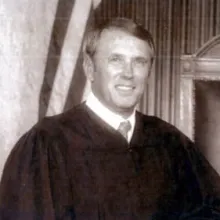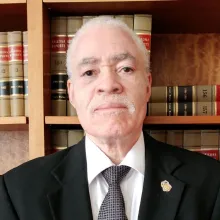University of Arizona to Honor Three Distinguished Alumni at 2021 Lifetime Achievement Awards

University of Arizona James E. Rogers College of Law Lifetime Achievement Award recipients are selected by faculty for their distinguished and exemplary careers, contributions to the legal profession, support for public causes and law reform, and commitment to the pursuit of justice.
This year, University of Arizona Law recognizes Justice Frank X. Gordon, Jr. (‘54), Dee-Dee Samet (‘63) and Judge Raner C. Collins (‘75).
Lifetime Achievement Awards Reception
Date: Friday, Nov. 5, 2021
Time: 4:30 – 6:30 p.m.
Where: James E. Rogers College of Law, Lewis Roca Rothgerber Christie Lobby & Snell & Wilmer Courtyard
Who may attend: This event and free and open to all alumni, family and students. RSVP is requested.
2021 Honorees
Frank X. Gordon, Jr., Class of 1954 (posthumous)

Frank X Gordon, Jr., an esteemed justice on the Arizona Supreme Court and consummate public servant, grew up in Kingman, Arizona, then a small rural community. He received a Bachelor of Arts from Stanford University in 1951, and his Juris Doctor from the University of Arizona College of Law in 1954. After earning his law degree, Justice Gordon returned to Kingman to practice law with his father in the law firm of Gordon & Gordon, at a time when they were two of only five practicing attorneys in Mohave County.
At age 33, Justice Gordon was elected to the Mohave County Superior Court. Thirteen years later, Governor Raul Castro appointed him to the state’s highest court — the first appellate court appointment using the merit-selection process established in 1974. He served as Chief Justice from January 1987 to December 1992. As Chief Justice, Gordon presided over the impeachment trial of then-Governor Evan Mecham in 1988. In 1990, Gordon received an American Bar Association Pro Bono Publico Award for his efforts on behalf of the poor through his stewardship of the Volunteer Lawyers Program of Phoenix.
After retiring from the Arizona Supreme Court in 1992, Justice Gordon joined the Phoenix firm of Roush, McCracken & Guerrero, but he remained active in public life. United States District Judge Paul Rosenblatt appointed Justice Gordon to mediate a dispute between various Native American tribes and the State of Arizona about gaming. In February 1993, Justice Gordon endorsed a proposal put forth by the tribes to allow them to operate slot machine casinos in their territories.
In 1994, Justice Gordon traveled to Belarus at the request of the U.S. State Department to meet with a committee of their Parliament to evaluate their constitution and help the country’s transition from a totalitarian socialist state to a democracy. In 2006, Justice Gordon joined People to People Ambassadors of the American Bar Association. In that role, he traveled to China to meet with lawyers, judges, and embassy officials to discuss the “rule of law.” Justice Gordon’s autobiography From a Boy with a Horse to a Man with a Gavel was published in 2016. He died on January 6, 2020, in Phoenix.
Dee-Dee Samet, Class of 1963

Dee-Dee Samet earned her Bachelor of Arts and Juris Doctor from the University of Arizona, graduating from the College of Law in 1963, one of only three women in her class. For over five decades, she has devoted her law practice to public benefits work, focusing on Social Security Disability, Supplemental Security Income, and Worker’s Compensation. She is a Certified Specialist in Workers Compensation and is past co-chair of the Alternative Dispute Resolution Section and the Worker's Compensation Section of the Arizona State Bar. Since 1985, Samet has been a Judge Pro Tempore with the Pima County Superior Court.
Samet’s record of professional service at the national, state, and local level is extraordinary. She served as president of the Arizona State Bar in 1999-2000, the third woman to hold that position. In that role, she was a member of the Executive Council of the National Conference of Bar Presidents. A member of the Arizona State Bar Board of Governors and the Arizona State Bar Foundation Board for many years, Samet also served as president of the statewide Arizona Women Lawyers Association, the William D. Browning Federal Bar Association, and the Pima County Bar Association. Samet also served as co-chair of the United States District Court’s Gender Equality Task Force. Her community service includes board membership with Casa de Los Ninos, Southern Arizona Children’s Advocacy, Tucson Homeless Connect, and the Invisible Theatre. Samet is currently the President of the Casa De Los Ninos Foundation Board.
Samet has been recognized for lifelong dedication to the promotion of women in the legal profession by receiving the Sarah Herring Sorin Award from the Arizona Women Lawyers Association and the Alice Truman Award from the Southern Arizona Chapter of the AWLA. Samet has also received the Fred Kay Award from the Federal Bar Association, the Juan Medrano Public Service Award from the Pima County Bar Association, the Soroptimist Award for Advancing the Status of Women, the YWCA Woman on the Move Award, the Founders Award from Greater Tucson Leadership.
Raner C. Collins, Class of 1975

Raner C. Collins was born in Malvern, Arkansas, and received a Bachelor of Arts degree from Arkansas Polytechnic College (now Arkansas Tech University) in 1973. He earned his Juris Doctor from the University of Arizona College of Law in 1975, one of two African American students in his class. After graduation, Judge Collins turned to the public domain as a young lawyer, serving as Deputy County Attorney with the Pima County Attorney’s Office. In 1981, Judge Collins began his judicial career as City Magistrate with the Tucson City Court. From 1985 to 1988, he served as Judge Pro Tempore for the Pima County Superior Court, and in 1988 he launched a decade of service as Superior Court Judge.
Judge Collins was nominated in May 1998 by President Bill Clinton to the United States District Court for the District of Arizona. He was confirmed by the Senate in July 1998 and received commission in August 1998. In September 2013 Judge Collins became Chief Judge of the District Court for the District of Arizona, the first African American to serve in that position. He assumed senior status in March 2019 and continues to hear cases.
Judge Collins has presided over many notable cases during his years on the federal bench. One such case was the longstanding school litigation, Flores v. Arizona, in which he ordered the Arizona Legislature to pay for adequate English language instruction in public schools or face mounting monetary sanctions. Judge Collins also presided over the original criminal trial and retrial involving Lonnie Swartz, a border patrol agent who faced manslaughter charges for the fatal shooting of a teenaged Mexican boy across the border. In addition, he heard the case of United States v. Scott Warren in which the human rights activist Warren was acquitted of charges of illegally harboring undocumented immigrants.
Judge Collins, known as an impartial and conscientious jurist, has been recognized by local and statewide organizations for his many achievements. He received the Distinguished Alumnus Award from the University of Arizona in 2008. Judge Collins and his wife Theresa Collins have two children and five grandchildren and view family and religion as of central importance.
